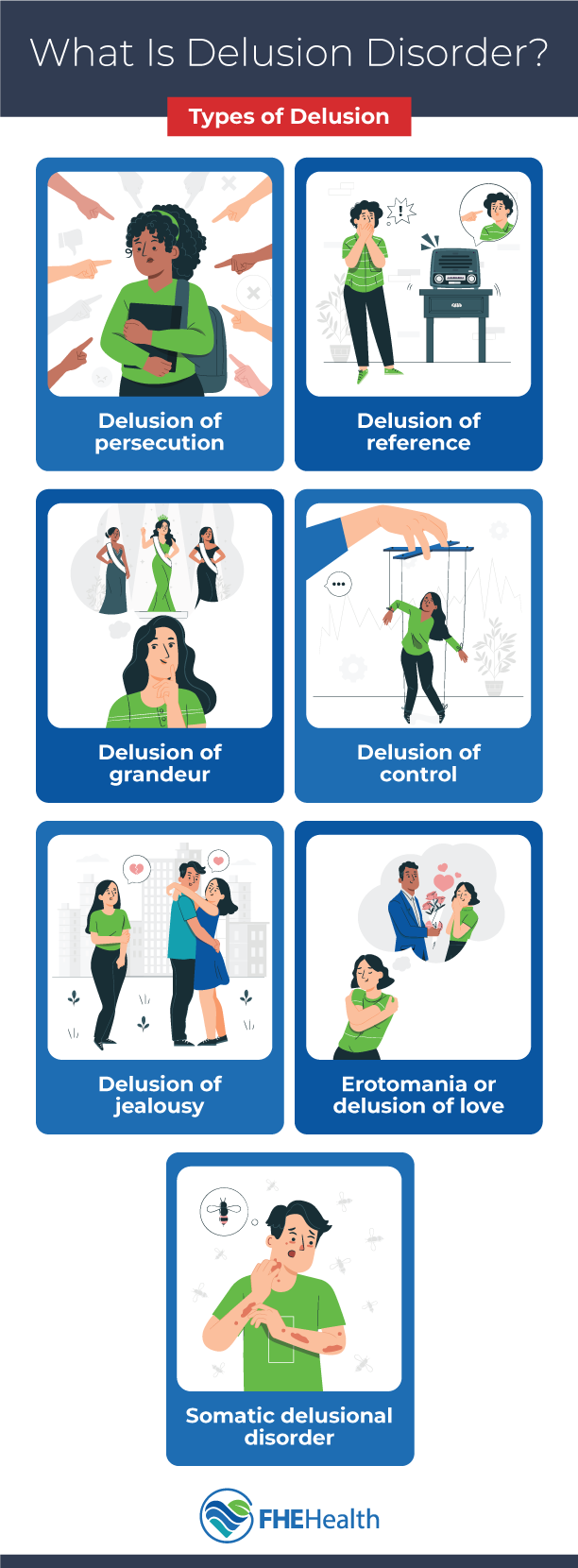
Movies and television may portray characters experiencing delusions as part of a storyline or plot. News accounts of individuals acting bizarre and threateningly often describe the person as delusional. Are these accurate descriptions or stereotypes? What is a delusional disorder, and what does it look like?
What a “Delusion” Appears As
When an individual cannot separate reality from imagination and starts to believe things that are false or couldn’t exist, they may have a delusion. They may be argumentative, and their points may seem convincing. But when the facts are otherwise, and you know that what the person is saying is untrue and didn’t or couldn’t happen, this is a red flag indicating a delusion.
Dr. Beau A. Nelson, DBH, LCSW, FHE Health’s Chief Clinical Officer, recommends “be careful challenging or trying to talk someone out of a delusion or firmly held irrational belief, this is a place for professional intervention, as the person suffering may be aggressive, violent, or unsafe while they are dealing with a brain issue they cannot control. Always err on the side of caution and safety when dealing with these kinds of psychiatric problems.”
The person with the delusion can be highly emotional. Being in pain and suffering something that seems real to them—when others don’t believe it—can be intensely stressful. The individual may be irritable, angry, aggressive, constantly complaining, dismissive of others, accusatory, and challenging to be around. They may be incessant gamblers, believe others are plotting to get them, inflict wounds upon themselves, harass others, and hang around with people who believe their delusional thinking.
Hallucinations are another classic sign of someone having a delusion, although not everyone who experiences hallucinations has a delusional disorder. Hallucinations are symptoms of other mental health disorders as well.
Delusion Disorder: What Is It?
A delusional disorder is classified as a type of psychotic disorder. Previously, it was identified as a paranoid disorder. The chief symptom of this disorder is the existence of delusions. The individual diagnosed with delusional disorder exhibits delusional thinking and experiences several types of delusions.
The fifth edition of the Diagnostic and Statistical Manual of Mental Disorders (DAM-5) outlines five criteria for the diagnosis of a delusional disorder:
- The delusions (one or more) must exist for a month or longer.
- No diagnostic criteria for schizophrenia have been met. If hallucinations exist, they are related thematically to the individual’s theme of delusions. The hallucinations are also not prominent.
- Outside of the ramifications and impact of the delusions, the individual does not show marked impairment, and their behavior is not blatantly odd or bizarre.
- Episodes of mania or depression, if they have occurred, last only briefly relative to how the delusional thinking and symptoms exist.
- Another mental health disorder does not explain delusions (like obsessive-compulsive disorder or OCT) and isn’t caused by substance use or abuse, medication, or medical condition.
What Is an Example of a Delusional Disorder?
Discerning whether someone has a delusional disorder requires a medical diagnosis. However, there are examples of delusional disorder, each falling under various themes of the types of delusions. Someone with a delusional disorder may believe they are a famous person, a movie star, the president or king of a country, or a divine being.
Another example of a delusional disorder is someone who believes others are out to get them, inflict bodily harm, or otherwise ruin their lives, even though no such threat exists. Some with delusional disorders believe other people can hear their thoughts. Extreme and unrealistic jealousy or the unshakeable belief that a partner is cheating on them is yet another example of delusional disorder.
What Are the Types of Delusions?
The DSM-5 lists four types of delusions. These types of delusions include:
- Bizarre: These delusions are either impossible, like alien abduction, or implausible.
- Non-Bizarre: This delusion could occur, such as stalking, infidelity, or someone trying to kill you.
- Mood-Congruent: When in a manic phase of bipolar, mood-congruent delusions may include superiority and fame, while persecution and abandonment delusions are possible in depression.
- Mood-Incongruent: These are delusions independent of a mood state. They include delusions that the world is about to end or that some powerful force outside the individual controls their movement or thoughts.
In 1910, in an essay entitled “General Psychopathology,” Karl Jaspers listed specific criteria for delusions and aspects of jealousy. The three descriptors were certainty of conviction, incorrigibility or unchangeable, and impossibility (implausible). In the first, the person believes with all their being that the delusions are real, logic to the contrary. In the second, the individual refuses to update their beliefs even in the face of incontrovertible evidence. In the third, the individual’s delusion is untrue and most likely impossible and implausible while appearing very bizarre.
The types of delusions depend on the primary themes of delusions the individual experiences and whether the theme is persecutory, jealous, somatic (the belief that something is wrong with your body), grandiose, erotomanic (the unfounded belief that someone is in love with you), or mixed.
Is Delusion a Mental Illness?
Delusions alone don’t indicate that someone has a mental illness. Someone may experience a delusion or have delusional thinking due to taking medications or illegal substances. The delusions may occur after misuse or abuse of prescription narcotics, combining pills with alcohol, or using heroin, methamphetamine, cannabis, fentanyl, and other drugs or combined with alcohol. Some medical conditions may cause delusions, such as Parkinson’s disease, brain tumor or injury, disturbed sleep, and extreme stress.
Research shows that people experiencing social isolation may develop delusions. Those who are elderly, visually impaired, deaf, and immigrants with language difficulties may be more likely to have delusions gradually appear.
Just because someone has delusions does not mean they have a delusional disorder.
How We May Misuse/Accuse Someone of Being Delusional
It is unfortunate that too often, people misuse the term delusional or accuse someone of being delusional. They don’t mean to be insensitive, but the use of the word has become common in society. People give little thought to making comments like, “You’re delusional.” Not only do they not realize this is inappropriate, but they don’t understand how it can hurt the person the comment is directed to.
Furthermore, when someone appears to show delusional thinking through their erratic actions, statements, and emotions, we may mistakenly dismiss their condition by labeling them delusional. Their delusions could be brief and symptoms of a treatable medical or mental health condition. As such, they deserve respect and empathy, not accusations.
How Delusions Can Be a Symptom of Several Mental Health Issues
Delusions are not a symptom of a single mental health disorder. People struggling with several mental health issues may have delusions among the range of symptoms they experience. Delusions are commonly found in people with schizophrenia, schizoaffective, and delusional disorders. However, delusions may also occur in those in the manic phase of bipolar disorder and major depressive disorder (with psychotic features).
Schizophrenia vs. Delusional Disorder
While delusions occur in schizophrenia and delusional disorder, there are distinct and subtle differences in characteristics, themes, onset, duration, and treatments.
The National Institute of Mental Health (NIMH) says that delusions are a common symptom of schizophrenia, a severe mental illness that requires lifelong treatment. With schizophrenia, the individual interprets reality abnormally and appears out of touch with reality. They may also experience disordered thinking, hallucinations, speech, and behavioral changes, all distressing to them and their families. They’re unable to engage or find it challenging to engage in everyday activities.
The onset of schizophrenic symptoms is generally diagnosed when the person is between 16 and 30 years old and occurs after an initial episode of psychosis. The National Alliance on Mental Illness (NAMI) says that schizophrenia occurs in about 0.25 to 0.64 percent of adults in America. Symptoms fall into categories of psychotic, negative, and cognitive. Delusions are included in the psychotic category, along with hallucinations, thought disorder, and movement disorder.
The most common delusion with schizophrenia is persecutory. Another is delusions of grandeur.
Risk factors for developing schizophrenia include genetics, environment, brain function, and structure. Those with schizophrenia are generally not violent, although their risk of self-harm and committing violence toward others increases if their condition goes untreated.
On the other hand, people with delusional disorders can still function. Their behavior is not overtly bizarre. The onset of delusional disorder is later than schizophrenia. Delusional disorder is rare, occurring in 0.05-0.1 percent of the population.
With delusional disorder, there are no other psychotic symptoms besides delusions. Daily functioning is also not as negatively affected as it is with schizophrenia. The most common types of delusions with a delusional disorder in men are persecutory and jealous, while in women, it is the erotomanic type.
An Accusation is Not a Diagnosis How This ‘Symptom’ is Often Used Loosely
Casually accusing someone of being delusional, engaging in delusional thinking, or having a delusional disorder is not a medical diagnosis. The loose use of the symptoms of delusions can wreak harm on the person it’s directed toward or said about.
Help Is Available
If you or someone you care about is experiencing delusions and they have persisted for a month or longer, it is essential to seek medical help right away. The sooner a diagnosis can be made and treatment starts, the better the long-term prognosis. At FHE Health, our experts are always available to answer questions, provide resources, and let you know we’re here to help.







